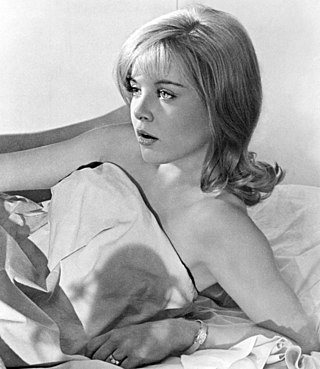Lolita is a 1955 novel by Vladimir Nabokov.
Contents
- People
- Arts, entertainment, and media
- Films
- Music
- Other arts, entertainment, and media
- Other uses
- See also
Lolita may also refer to:
Lolita is a 1955 novel by Vladimir Nabokov.
Lolita may also refer to:
Lulu may refer to:

Suellyn Lyon was an American actress who is most famous today for playing Vladimir Nabokov's Lolita in Stanley Kubrick's 1962 film adaptation of Nabokov's eponymous novel, for which she was awarded a Golden Globe.
Bliss is a common noun meaning 'extreme happiness'. It may also refer to:
Glory may refer to:

Lolita is a 1962 black comedy-psychological drama film directed by Stanley Kubrick, based on the 1955 novel of the same name by Vladimir Nabokov.

Despair is the seventh novel by Vladimir Nabokov, originally published in Russian, serially in the politicized literary journal Sovremennye zapiski during 1934. It was then published as a book in 1936, and translated to English by the author in 1937. Most copies of the 1937 English edition were destroyed by German bombs during World War II; only a few copies remain. Nabokov published a second English translation in 1965; this is now the only English translation in print.
Lolita, My Love was an unsuccessful musical by John Barry and Alan Jay Lerner, based on Vladimir Nabokov's 1955 novel Lolita. It closed in Boston in 1971 while on a tour prior to Broadway.
"Lolita" is an English-language term defining a young girl as "precociously seductive." It originates from Vladimir Nabokov's 1955 novel Lolita, which portrays the narrator Humbert's sexual obsession with and victimization of a 12-year-old girl whom he privately calls "Lolita", the Spanish nickname for Dolores. Unlike Nabokov, however, contemporary writers typically use the term "Lolita" to portray a young girl who attracts adult desire as complicit rather than victimized.
"Lolita" is a song by Spanish singer-songwriter Belinda, released as the first promotional single from her third studio album Carpe Diem.
Pinocchio is the boy-puppet from the 1883 novel The Adventures of Pinocchio by Italian author Carlo Collodi.
Laura may refer to:
Lolita is a female given name of Spanish origin. It is the diminutive form of Lola, a hypocorism of Dolores, which means "sorrows" or "pains" in Spanish. Originally originated from Sanskrit word Lalita.

Arturo Buzzi-Peccia was an Italian singing instructor and song composer.

The Enchanter is a novella written by Vladimir Nabokov in Paris in 1939. As Волшебник (Volshebnik) it was his last work of fiction written in Russian. Nabokov never published it during his lifetime. After his death, his son Dmitri translated the novella into English in 1986 and it was published the following year. Its original Russian version became available in 1991. The story deals with the hebephilia of the protagonist and thus is linked to and presages the Lolita theme.

Lola is a feminine given name and nickname in the Romance languages, and other language groups.
Luna commonly refers to:

Lolita is a 1955 novel written by Russian-American novelist Vladimir Nabokov that addresses the controversial subject of hebephilia. The protagonist is a French literature professor who moves to New England and writes under the pseudonym Humbert Humbert. He describes his obsession with a 12-year-old "nymphet", Dolores Haze, whom he kidnaps and sexually abuses after becoming her stepfather. Privately, he calls her "Lolita", the Spanish diminutive for Dolores. The novel was originally written in English, but fear of censorship in the U.S. and Britain led to it being first published in Paris, France, in 1955 by Olympia Press.

Lolita (Лолита) is an opera in two acts by composer Rodion Shchedrin. Composed in 1992, it uses a Russian language libretto by the composer which is based on Vladimir Nabokov's 1955 novel of the same name, written in English. The opera premiered in 1994 at the Royal Swedish Opera, Stockholm, using a Swedish language translation of the original libretto.

"Lolita" is a song recorded by American singer Leah LaBelle. It was released on May 7, 2013, through Epic. The single was written by American songwriter Kelly Sheehan in collaboration with record producer Pharrell Williams. Backed by synthesizers and a bass guitar, it is a midtempo funk, R&B, and pop song with disco influences. Media commentators have suggested the song was inspired by Vladimir Nabokov's 1955 novel Lolita, and noted that its lyrics greatly diverge from the source material.
"Lolita", subtitled "Serenata spagnola", is an Italian song composed by Arturo Buzzi-Peccia.